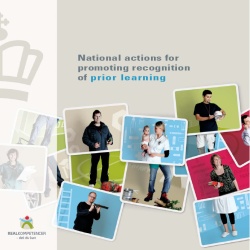
|

National actions for promoting recognition of prior learning
Resumé This publication gives a general introduction to the Danish actions for promoting recognition of prior learning. It defines what is recognition of prior learning and it gives a short review of the policy proces leading up to new regulations for recognition of prior learning. It describes the political proces from legislation to implementation of the new regulations for recognition of prior learning. In details it goes through each of the initiatives that the Danish Ministry of Education has carried out to promote recognition of prior learning within the adult and continuing education system.
Contents:
Preface Complete table of contents Ministry of Education © Ministry of Education 2007
Preface“If we want more people to get an education, it is important that we don't make them start from the beginning. People need to receive credit for the skills they have already learned. Let's implement this idea out where the rubber meets the road – in schools and at work places.” Bertel Haarder Globalisation and technological development lead to challenges that require the nation's workforce to raise its skill level. A central challenge is to encourage individuals to enrol in continuing education courses. One way to do this is to increase the use of prior learning assessments, in order to ensure that individuals' competencies are highlighted and recognised. This publication gives an introduction to the Danish actions for promoting recognition of prior learning. It defines prior learning and it gives a review of the policy process leading up to new regulations for recognition of prior learning. It also describes the policy process from legislation to implementation of the new regulations. Finally the publication goes through the initiatives that the Ministry of Education has carried out to promote recognition of prior learning within the adult and continuing education system.
Villy Hovard Pedersen
What is prior learning?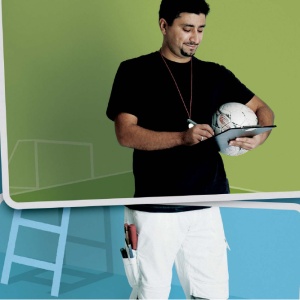
Prior learning is the knowledge, skills, and competencies a person has, regardless of how they were obtained. Highlighting and recognising an individual's prior learning as a part of their overall skills development is a way to build upon the lessons learned through work, liberal adult education, leisure activities, and in the educational system. It also helps building a bridge between the various learning environments. 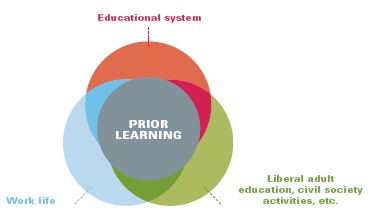
The new regulations passed by the government and parliament regarding development and recognition of prior learning give individuals improved opportunities for the adult and continuing education system to recognise their competencies.
Prior learning – a broadly founded political projectDenmark has a long tradition of individual competency evaluation. In the past, this has resulted in a focus on individual skills identification for:
Starting in 2004, an increased focus was placed on recognising prior learning, and in August 2007 the educational fields covered by the legislation were expanded to include following educational fields:
The current legislation builds upon a thorough political foundation. Since 2004, a broad political majority has supported expanding recognition of prior learning. Prior to the changes, the Ministry of Education, the Ministry for Science, Technology and Development, the Ministry of Culture, and the Ministry of Economic and Business Affairs presented the policy paper Recognition of Prior Learning Within the Education System to parliament. The paper, which was well received, presented new ideas for how Danes could achieve personal growth and learn new skills – in the liberal adult educational system, on the job, through liberal adult education, and by volunteering. The main idea of the report was to present ways to develop hidden competencies, and how to bring them out into the light. The message was: “Whatever you can do counts”. A Danish version of the report can be downloaded from
http://static.uvm.dk/publikationer/2004/realkompetencer 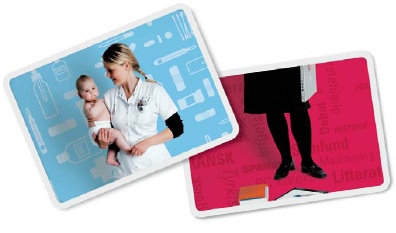
In 2005, as a follow up to the policy paper, the Ministry of Education published a discussion paper about recognition of prior learning titled “Your skills – finding Denmark’s hidden competencies”. The goal of the paper was to set a new agenda for the discussion of Danes' competencies, as well as to launch a national skills improvement movement that would help make the political vision a reality. The discussion paper describes why recognition of prior learning is necessary for Denmark, and identifies the challenges and questions Denmark faces in recognising prior learning. The Danish discussion paper can be downloaded from http://static.uvm.dk/publikationer/2005/detdukan All this preparation resulted in the passing of new rules relating to the development and recognition of prior learning in the adult and continuing education system, which became effective on 1 August 2007. Therefore, Minister of Education Bertel Haarder placed prior learning and the new legislation on the political agenda during the 2007 Sorø Meeting. Education ministers traditionally use the annual Sorø Meeting to call together education professionals to discuss current policy issues. The 2007 meeting was titled: “Learning for Life – a conveyor belt to reality”, and the participants discussed the challenges and the opportunities associated with prior learning. The broad range of views on the topic was compiled and published by the ministry. For more information about this publication in Danish: http://static.uvm.dk/publikationer/2007/soroe07
What do the new regulations mean?The new regulations mean that adults have the right to ask an educational institution to assess their prior learning in order to obtain a recognition of their competencies in the adult and continuing education system. Assessment of prior learning gives the individual the opportunity to:
For more information about the Qualification Board and the rules for appealing:
In Danish 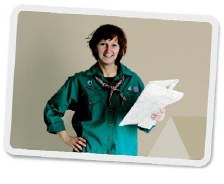
Principals for assessment and quality assuranceThe Danish concept for recognition of prior learning is based on the following principals:
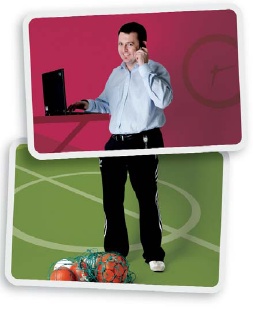
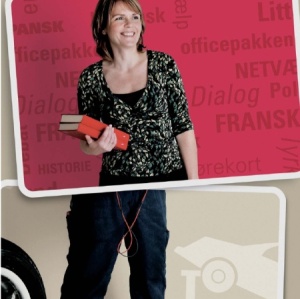
From legislation to implementationWith new opportunities available to it, the Ministry of Education launched a number of initiatives that seek to improve the knowledge of prior learning assessment, and to promote its use. In short, the initiatives include:
”Prior learning is here
to stay. And it is a way
to get people to look at
their educational
opportunities in a
new way” “This partnership agreement allows us to be a part of setting the agenda when it comes to
finding solutions for people who normally aren't motivated to enrol in continuing education.
Prior learning assessments will help profile individuals' qualifications and make them more
attractive to employers.” 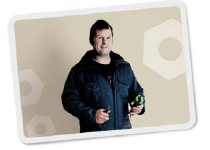
In the following the Danish actions for promoting recognition of prior learning is described. Partnership with labour and employer organisationsIn June 2007, the Ministry of Education entered into an agreement with LO – The Danish Confederation of Trade Unions, DA – The Federation of Danish Employers, FTF – The Confederation of Danish Professionals and The Danish Association of Managers and Executives, regarding recognition of prior learning. The goal of the partnership is to promote recognition of life skills – prior learning – in order to encourage greater use of adult and continuing education programmes geared towards the labour market. The Ministry of Education and the labour market organisations agreed to co-operate in the following areas:
The organisations agreed to pass on news about new opportunities to receive prior learning assessments.
“The benefit of recognising people's prior learning is that you don't need to start from
scratch when you want to begin an education. You get credit for the things you can do.
People's experiences will now be officially recognised, and I feel that will help motivate
more people to go back to school.” Prior learning campaignIn the spring of 2008, the Ministry of Education in co-operation with the social partners created a prior learning information and networking campaign. The goal of the campaign was to inform about the new regulations for development and recognition of prior learning in the adult and continuing education system, and to promote the opportunities they opened. The campaign was divided up into four tracks, aimed at each of the different groups:
The effect of the campaign amongst labour market organisation members was positive. It was mentioned in newsletters, member publications, as well as in articles in the general press. Overall, it was a success.
Flexible toolbox 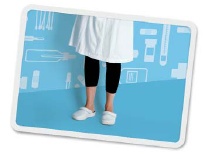
“Managers need to encourage employees to get an education. Unskilled jobs
are disappearing, and if you don't update your skills, you'll find yourself
outdated before you know it.” The toolbox contains an overview of the campaign and its main message. In addition, it contains a ministry-approved fact sheet with:
As part of the campaign, over 25,000 people completing vocational programmes received a letter of congratulations from Minister of Education Bertel Haarder and two information postcards. The letter and the cards were intended to motivate course participants to encourage their friends and colleagues to request a prior learning assessment. My Competence PortfolioIndividuals requesting a prior learning assessment must provide documentation of their competencies, such as:
A skills portfolio www.minkompetencemappe.dk will serve as a documentation tool for anyone wishing to maintain an overview of the things they have learned and the skills they possess, particularly if they are involved in an adult or continuing education programme and request an individual competency evaluation from the educational institution. Companies interested in promoting prior learning assessments and employee skills development can also use the portfolio. The Competence Portfolio is available in Danish and English at www.minkompetencemappe.dk Competencies from liberal adult education and civil society activitiesThree special tools have been developed in order to help individuals document skills obtained from leisure activities, liberal adult education and civil society activities. The tools are tailored to the type of organisation, and can be accessed using links from the My Competence Portfolio web site.
The portfolios allow people to list skills gained from:
Leisure activities:
www.realkompetence-forening.dk 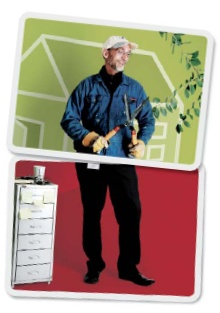
These tools include a guide with self-assessment questions. They also provide a system for identifying individual skills, including social and personal skills. They have been developed for the Ministry of Education with the help of some of the largest organisations within the fields. Knowledge and information about Prior LearningNational Knowledge Centre for Validation of Prior Learning The National Knowledge Centre for Validation of Prior Learning (NVR) was established in the fall of 2007 and is funded by a three-year grant from the Ministry of Education. The goal of the NVR is to collect, develop, and disseminate information about recognising prior learning, with special focus on methods for documenting and assessing prior learning. The NVR's primary tasks are:
More information about NVR is available on-line in Danish and English at www.nvr.nu Handbook for prior learning assesment In April 2008, the Ministry of Education published Prior Learning Assessment in the Adult and Continuing Education System – a Handbook. The handbook, to be used by adult and continuing education institutions, provides general information about assessment and recognition of prior learning. It is designed to provide people who work with prior learning assessment with an overview of the background, terms, regulations, best practices, and challenges. Case studies are used to present examples of prior learning assessment within several fields of study. Download this handbook in Danish from http://static.uvm.dk/publikationer/2008/rkvivoksen/ The Ministry of Education has also published a handbook for prior learning assessment specifically for use by adult vocational training centres. Lifelong learning information campaign In the autumn of 2007 the Danish Broadcasting Corporation aired a series of nine television episodes focusing on lifelong learning. Made possible with support from the Ministry of Education, the programmes were intended to encourage people, particularly people with short-cycle educations to enrol in adult and continuing education programmes. Two of the episodes dealt with the new opportunities to request prior learning assessments.
Information to the general public
The Ministry of Education's portal and
educational guidance –
|
||
|
To the top of the page |
